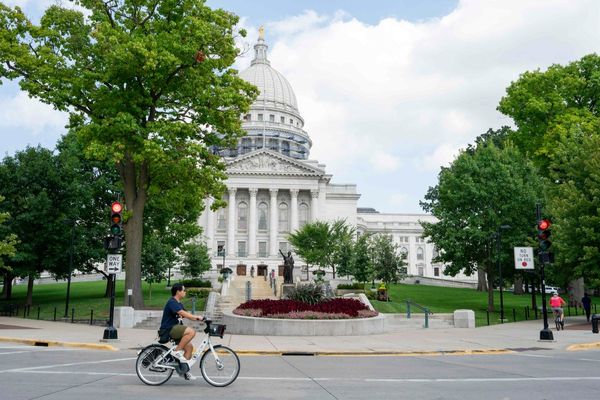ALBANY, N.Y. — Lee Zeldin’s plan to tackle crime if elected governor of New York, which includes suspending state laws and rolling back criminal justice system reforms, is being slammed by Democrats as nothing more than “political pandering” based on fearmongering.
Democrats in the state Legislature are incensed over the Republican congressman’s potential power grab and his plan to “force” lawmakers to revisit cashless bail and other measures. Experts also say the proposed suspension of state laws isn’t supported by data.
Assemblywoman Latrice Walker, D-Brooklyn, believes Zeldin, hoping to unseat Gov. Hochul on Election Day, fails to grasp the underlying problems facing New York and argues that his law and order message lacks substance.
“Lee Zeldin’s entire platform has been based on lies, misinformation and fearmongering around the issue of crime,” Walker, one of the lead sponsors of the state’s cashless bail reforms, told the Daily News. “This is a lot of political pandering.”
Polls show a tight race between Gov. Hochul, a Democrat hoping to secure a full term in office after replacing Andrew Cuomo last year, and Zeldin — and New Yorkers consistently rank crime as their top concern.
Zeldin has zeroed in on the issue, holding near-daily campaign appearances at crime scenes or places linked to violent incidents across the five boroughs and calling for a full repeal of the state’s cashless bail system.
Additionally, his “Day One” plan includes declaring a state of emergency in order to suspend bail reforms as well as other progressive measures including changes to discovery and speedy trial laws, and statutes limiting the use of solitary confinement in prisons and jails.
Exactly how such a move would play out is unclear.
“Someone get this man a copy of the state’s constitution please,” state Sen. Zellnor Myrie, D-Brooklyn, tweeted in response to Zeldin’s platform.
A day after sparring with Hochul in the sole scheduled debate in the governor’s race, Zeldin said last week his plan to suspend the laws would “force the state Legislature just to come to the table.”
Top among Zeldin’s targets is cashless bail, meant to prevent people who cannot afford bail from languishing in jail for low-level offenses, which was enacted in 2019 and has already been amended twice.
The system, which only applies to misdemeanors and nonviolent crimes, has become a lightning rod of controversy in the political arena as Republicans have linked it to rising crime and repeat offenders.
Michael Rempel, director of the Data Collaborative for Justice at John Jay College, said the numbers just don’t back up those ties.
“We don’t yet have a rigorous, apples-to-apples study comparing recidivism between people assigned to bail and people released due to the reforms,” Rempel said.
Research conducted by academics and independent nonprofits, including Arnold Ventures, actually shows a link between pretrial detention and higher recidivism rates once people are eventually released.
”Putting people in jail unnecessarily, misusing jail, increases the likelihood that they will commit more crimes when they come out,” said Dr. Jeffrey Coots, director of the From Punishment to Public Health Initiative based at John Jay College.
Zeldin and other critics have also argued that changes to New York’s discovery laws have hampered prosecutions and led to an uptick in the dismissal of charges.
Data collected by the Office of Court Administration shows no increase in the dismissal of felony cases in the wake of the reforms, which require prosecutors hand over evidence to defense attorneys in a timely manner.
“There’s no evidence on its face that people facing serious charges, felonies, are more likely to have their cases dismissed on the speedy-trial grounds,” Rempel added.
The other laws Zeldin would like to suspend include the recently enacted Less is More Act, which is meant to reduce the number of parolees jailed for minor violations; the HALT Act, which caps the time a person can be held in segregated confinement housing to 15 days; and Raise the Age, which increased New York’s age of criminal responsibility from 16 to 18 years old.
Coots said that science and research have proven that treating teens as adults does more long-term harm and compounds racial disparities in the justice system.
“Coming to the table and recognizing we need to do better for our kids, that was the right decision then,” he said of the 2017 law. “Many of us have come to see that we can’t punish our way out of a lot of these social problems that we’re confronting.”
Coots also pointed to the impacts of isolation everyday New Yorkers experienced during the COVID pandemic to illustrate the problems of using solitary confinement as punishment within the prison system.
“It’s just frankly inhumane to take people who are already socially isolated by the fact that they are incarcerated and then, further, really just deprive them of any human contact,” he said.
Zeldin, however, has blamed the recently enacted HALT Act for an uptick in assaults against correction officers across the state. Statistics from the state Department of Corrections show violent incidents in prisons have been on the rise for nearly a decade.
While Zeldin has accused the governor of inaction, both Mayor Adams and Hochul have floated changes related to gun charges that would allow more adolescents to be tried as adults.
Hochul also pushed lawmakers to make several gun-related crimes bail-eligible and to allow judges more discretion when setting bail during budget negotiations earlier this year.
The governor, joined by Attorney General Letitia James, argued last week that more data is needed before any additional changes are made.
“Time and again, Lee Zeldin has shown New Yorkers that he doesn’t have a plan to keep our communities safe,” Hochul campaign spokesman Jerrel Harvey said in a statement. “Zeldin has zero credibility, and he can’t be trusted to lead New York State.”
Zeldin’s campaign did not respond to questions about the criticisms.
During last week’s debate, Zeldin repeatedly returned to crime as the prime issue in the race. However, when asked about other hot topics such as abortion he argued, counter to his crime plan, that the Dem-led Legislature would prevent him from unilaterally making any changes to state laws.
At a campaign event on Thursday in Syracuse, Zeldin said he believes the public is on his side and that his plan will make New York safer.
“New Yorkers all across this state want to see Albany doing more to make our streets safer,” he said. “They don’t want to see pro-criminal laws passed. As a matter of fact, many of them are looking for an overhaul of the laws already passed.”
Experts countered Zeldin’s claims, suggesting that rolling back criminal justice reforms would further extend the state’s problems with crime by not addressing root causes such as poverty.
“The idea that suspending these laws will help address crime is nonevidence-based while at the same time it is very easy to see some negative effects of suspending some of these things,” Remsen said.
Walker argues that Zeldin is not putting any serious solutions forward and is instead seeking “political soundbites” as he attempts to capitalize on New Yorkers’ fears.
She added that come Election Day, voters will not be swayed by Republicans’ emotional arguments and Zeldin’s focus on crime won’t be enough to catapult him to office.
“I have every confidence that on Inauguration Day, Lee Zeldin won’t be declaring a state of emergency on anything,” she said. “Like New Yorkers from every corner of the state, he’ll be watching the inauguration on television.”
____






